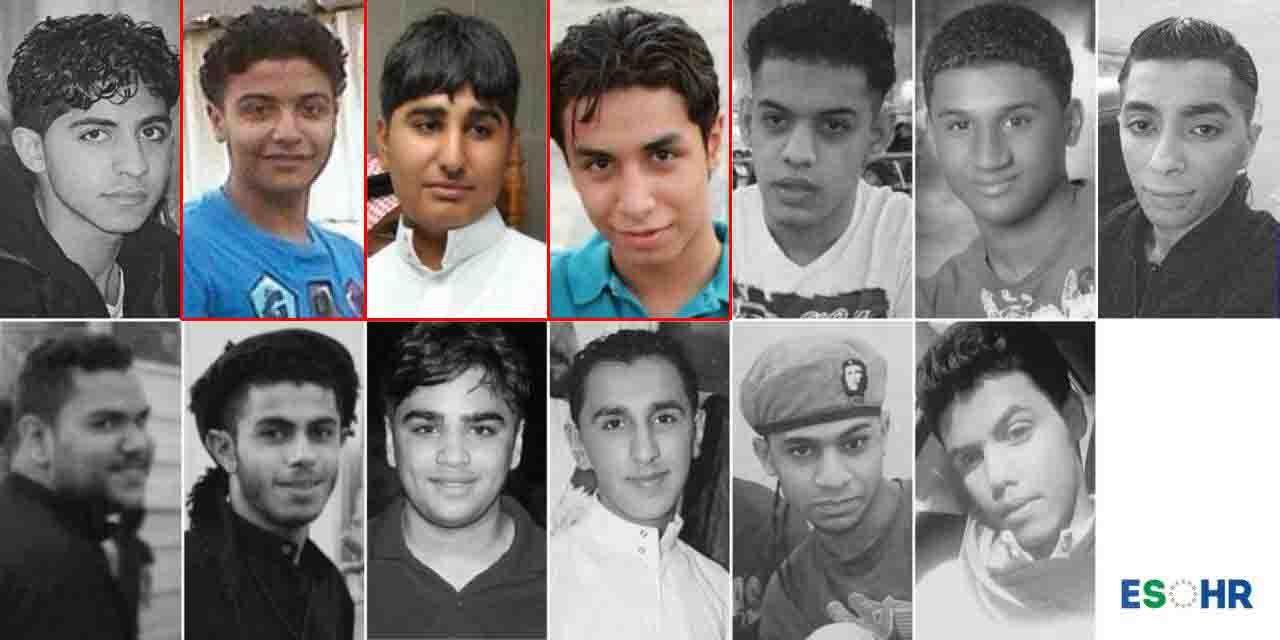
On 26 August 2020, the Human Rights Commission in Saudi Arabia announced that the Public Prosecution had referred for resentencing “the death sentences issued against three persons previously convicted of crimes they committed while minors, namely Ali al-Nimr, Dawood al-Marhoon and Abdullah al-Zahir.”
The statement indicated that this decision is an implementation of the royal order issued in March 2020, which provided that children sentenced to death prior to the passage of Saudi Arabia’s 2018 Juvenile Law would be resentence. The statement clarified that the Saudi Juvenile Law stipulates that the maximum penalty for “anyone convicted of a crime committed when he was a minor is 10 years. The judgment shall be executed in the juvenile detention home.”
The European Saudi Organization for Human Rights (ESOHR) affirms that the decision to review the judgments must coincide with the immediate release of the three children who are arbitrarily detained, as per a United Nations Working Group on Arbitrary Detention decision on their case, and that the upcoming retrial must guarantee the conditions for a fair trial that were lacking in the previous trial.
ESOHR notes that this decision came after several killings of minors with unfair rulings. Our monitoring has shown that 11 minors have been executed during the reign of King Salman, including: Mustafa Muhammad Abakar, Mishaal al-Faraj, Amin al-Ghamdi, Ali al-Rabah, Saeed al-Skafi, Mojtaba al-Suwaiket, Salman al-Quraysh, Abdullah Al Sarih, Abdul Karim al-Hawaj, Abdul Aziz al-Sahwi, and Abdul Mohsen al-Ghamdi. They faced unfair trials, and most of them were killed on charges related to their exercising legitimate and protected international rights, such as protesting. We additionally note that their remains have been withheld from their family, denying them the right to adequate burial.
In addition, ESOHR expresses its concerns regarding minors who are still facing the risk of execution and whose numbers are not disclosed by the Saudi government in light of the lack of transparency and the absence of any role for civil society. ESOHR had documented a further ten cases related to minors: Mustafa al-Darwish, Abdullah al-Huwaiti, Ahmed al-Faraj, Ali al-Butti, Muhammad Hussein al-Nimr, Muhammad Essam al-Faraj, Ali Hassan al-Faraj, Jalal al-Labad, Sajjad al-Yassin, Yusef al-Manasif. They still face the risk of execution in various levels of litigation, and the latest announcement did not address their cases.
ESOHR is concerned that reducing the sentences of al-Nimr, al-Marhoon and al-Zahir, whose cases were raised by many countries and UN messages, raises concern about the possibility of using this declaration to promote the appearance of reform while still carrying out executions in less internationally-known cases. The fact that the text of the last royal decree has not been published raises a number of questions, the most prominent of which is the possibility of manipulating the age of minors. ESOHR is additionally concerned that the decree, when eventually published, will carve out exceptions that will allow the government to continue executing minors.
ESOHR stresses that the death penalty what should be obvious: once implemented, a death penalty cannot be retracted. Therefore, any measures and decisions must be decisive in terms of protecting the individuals who face them. Any decisions that do not include all minors at risk of execution are incomplete decisions.
ESOHR also indicates that in light of the information that was circulated about the Saudi government’s intention to stop the discretionary rulings, failure to take immediate measures and suspending rulings until these discussions are decided upon, should be considered to underestimate the value of the lives of individuals affected by the reforms, and raises doubts about its seriousness in the steps it announces.
